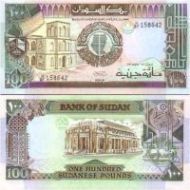FEATURE-Sudan to finalize currency change by the end of 2006
June 10, 2006 (KHARTOUM) — The change of the national currency form the Dinar to the Pound, which is expected to be conducted by the end of this year, comes as part of a completion of the development produced by the Comprehensive Peace Agreement (CPA).
 These changes stressed a confirmation given by President al-Bashir that the government will undertake the financing of the new currency printing without waiting for donors to step in for assistance.
These changes stressed a confirmation given by President al-Bashir that the government will undertake the financing of the new currency printing without waiting for donors to step in for assistance.
The New Sudanese Pound has been made equal to 100 Sudanese Dinars as determined by the joint technical committee concerned with issuing the currency. However, this may cause confusion among the citizens who will find it difficult to differentiate between the old Sudanese Pound, the Sudanese Dinar and the new Sudanese Pound.
The effects expected on the monetary and financial system were a focal point of a symposium organized by the National Centre for Diplomatic Studies at the Ministry of Foreign Affairs, which was attended by a host of specialists and other concerned people.
Director General of the General Administration of Research and Statistics at the central bank (Bank of Sudan), Mohamed al-Hassan al-Sheikh, explained that the re-printing cost of the currency is estimated at about 100 million dollars, stressing that the period allowed for the currency changing process will be reasonable, the state-run SUNA reported.
Al-Sheikh also said the Sudanese Dinar will remain in the use side by side with the new Pound which will be withdrawn from circulation gradually.
He also explained that the rate of the Sudanese Pound will be the same as that of the Dinar now in circulation to avoid public confusion. He further indicated that the changing of the currency synchronized with the gradual integration of South Sudan economy into the national economy.
Al-Sheik also underlined that some difficulties may arise due to the procedures of changing the currency. These difficulties, he said, are represented in determining the rate of exchange of the new currency against the free currency exchange rate can be maintained.
The rate of inflation may negatively be attested in the short- term level owing to an expected slow response by the public, needed for a quick currency changing process, Al-Sheikh said.
He also stressed the necessity of taking many measures so that the currency change process of the currency can contribute to monetary and financial stability by boosting the awareness among the people to avoid difficulties.
(ST)
